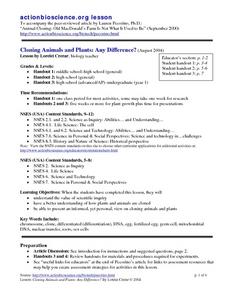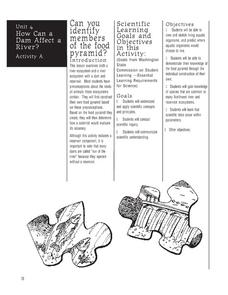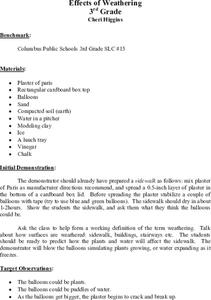Curated OER
Cloning Animals and Plants: Any Difference?
Students examine the process in which plants and animals are cloned. They compare and contrast the two procedures and determine if there is a difference. They share their views on cloning to the class.
Curated OER
Scientific Inquiry, Episode 1
Students look at ways to help the environment. In this recycling lesson, students watch a video on pollution and then collect trash at their school. They create posters to share with the school about the importance of recycling.
American Chemical Society
Isolation of Phytochrome
Why do soybean plants that are planted weeks apart in the spring mature simultaneously in the fall? Four independent activities cover the history of phytochrome research, scientist collaboration, the electromagnetic spectrum, and...
Curated OER
Habitat Assessment
Third graders demonstrate the effects of varying environmental components on plants and animals: chemical, physical and biological characteristics of a habitat. They find chemical, physical and biological characteristics of the lake at...
American Chemical Society
Joseph Priestley, Discoverer of Oxygen
Do you want to hear a joke about nitrogen and oxygen? NO. We all know there is oxygen in the air and that plants produce oxygen, but how was it discovered? Scholars read a handout, answer questions, and analyze material in the...
NASA
Producers Make Their Own Food
During an inquiry-based lesson, scholars decide which variable to test and then design an experiment to determine the needs of producers. After two weeks, they complete a full analysis and research paper.
NASA
Decomposers Get Energy From Dead Things
When life gives you mold, make penicillin. Scholars design an inquiry experiment to determine what causes rotting and mold growth. It also covers decomposers and the important role they play for other living things.
Curated OER
Renewable Energy Plants in Your Gas Tank: From Photosynthesis to Ethanol
Students examine the role photosynthesis plays in plant survival. In this renewable energy lesson students document their observations and analyze and interpret their results.
Curated OER
The Importance of Plants to Native Cultures in the Past and Present
Eighth graders investigate the founding and history of Sluice Boxes State Park. They use both primary and secondary resources to collect data. The focus is upon the use of native plants to make medicines. They write reports about several...
Foundation for Water & Energy Education
How Can a Dam Affect a River? Activity A
Written for Washington state students in life science, this lesson provides an opportunity to examine the residents of local freshwater habitats. You or the class collects a water sample, and learners try to examine what organisms live...
Curated OER
Scientific Inquiry
Students create a poster. In this recycling lesson, students discuss pollution and the ways humans negatively affect the environment. Students describe examples of litter or pollution they have experienced. Students collect litter from...
Curated OER
Lesson 12: Ho'olaulima: Let's Make a Hawaiian Garden
Second graders grow a classroom garden that acts as a living laboratory for cross-curricular activities. In this classroom garden lesson, 2nd graders follow directions to build and plant a garden that is used to teach math, science, and...
Curated OER
Numbers as Descriptors
Students use numbers as descriptors. For this mathematical inquiry lesson, students use numbers to describe, classify, and compare plants. Students are made aware that numbers can be used to describe things in the world around them.
Science 4 Inquiry
Eukaryotic Cells: The Factories of Life
Eukaryotes include humans, animals, and plants. Scholars learn about the parts of eukaryotic cells. They design models of a store and match the correct function of each part to the function of a part of the cell. They review their...
Mascil Project
Water Quality
How do you prevent the spread of water-borne illness in large public swimming areas? Scholars discover the challenges to identifying safe water through an inquiry experiment. They then produce posters sharing their understanding of water...
Curated OER
Altering a Plant Environment
Students investigate what a controlled group is by creating an experiment. In this plant growth lesson, students identify the different parts of a plant and discuss what is needed for a plant to be successfully grown. Students grow a...
Curated OER
What's In Our Backyard?
Eighth graders investigate the importance of an ecosystem by studying their own backyards. In this environmental activity, 8th graders examine a schoolyard or backyard by marking quadrants and recording any animal or plant findings on...
Curated OER
Photosynthesis and Cell Respiration
Fifth graders participate in scientific inquires regarding the concepts of photosynthesis and cell respiration. In this photosynthesis and cell respiration lesson, 5th graders describe the process of photosynthesis with relation to...
K20 LEARN
Transpiring Trees: Plant Transpiration and the Water Cycle
Looking for a tree-rific addition to your water cycle unit? Teams of young foresters examine the role of transpiration in the water cycle through a week's worth of activities. Pupils analyze how trees take in and transport water during...
Curated OER
Plants Under Attack
Third graders will identify the four needs for plant survival and gain skills and confidence in using scientific measurement tools, probes as well as the spreadsheets and graphing capacity of a computer to represent and analyze data.They...
Curated OER
Carrot Heads Garden
Students create a carrot garden. In this gardening lesson, students discuss the conditions needed in order to grown plants while creating their own garden. They read the story The Carrot Seed by Ruth Krauss.
Perkins School for the Blind
Building an Organic Molecule
Glucose is a simple sugar and a molecule that can be illustrated through modeling. Scientific investigators with visual impairments use hands-on models to reconstruct the process of bonding molecules. The tools used in this activity are...
Curated OER
Plants Releasing Water
Third graders investigate how water is released from different plants into the atmosphere. They observe and investigate two types of plants with domed lids with condensation and communicate those observances and inquiries on an in-class...
Curated OER
Effects of Weathering
Here's a great geology lesson for 3rd graders on weathering and erosion of soil. After a class discussion on how nature can "move a mountain," learners take a look at how a modern phenoma called acid rain can also cause weathering and...

























